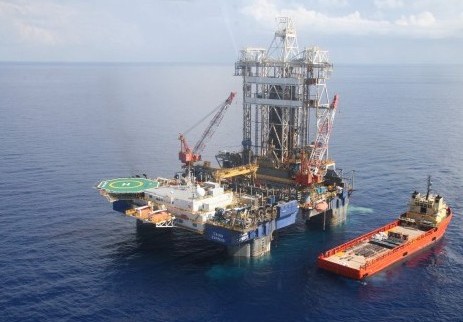There’s an interesting debate going on right now over whether to raise the liability cap on oil companies drilling offshore, and if so by how much. Just last week, Sen. Lisa Murkowski (R-Alaska) blocked an attempt to raise it from $75 million to $10 billion. Yesterday, Sen. James Inhofe (R-Okla.) blocked another attempt. (In related news, Murkowski has receive $218K from oil and gas companies in the last five years; Inhofe has received over $550K.) As Randy recounted, Interior Secretary Ken Salazar seemed to agree with Murkowski about the cap the other day at a hearing; Obama subsequently rushed out a statement bashing Republicans for blocking efforts to raise the cap. Meanwhile, Senate Majority Leader Harry Reid (D-Nev.) wants to get rid of the cap altogether. Mishegas!
Behind the political bumbling, however, lurk some interesting issues. The main argument against raising the cap is that it will price small, independent oil companies out of the offshore drilling market — they just can’t afford insurance with a cap that high. Which of course raises the question: If they can’t afford to insure against the damage they’re capable of doing, why should they be allowed to drill?
Then again, it’s clear that the price tag for the escalating Gulf oil disaster is going to be well north of $10 billion: the oil is flowing faster than ever, fisheries are being destroyed, the spill may soon enter the Loop current, cleanup will be ongoing for years, and much of the damage is going to be permanent. If BP had been forced to buy insurance against the true cost of possible disasters like this, it probably couldn’t have afforded to drill either.
The potential damage from offshore oil accidents is so great that no private industry can assume the full risk. So who assumes the remainder? You, the American taxpayer. Offshore oil companies privatize profit and publicize risk by necessity; it’s built into the size of the enterprise and the severity of the possible damage.
The situation isn’t unique to the offshore oil industry. Nuclear power is the same way. The possibility of a meltdown may be low, but if it happened the damage could be catastrophic beyond any company’s ability to pay. If the industry had to shoulder the full risk, it couldn’t operate. Thus the Price-Anderson Act, which offloads some of that risk onto the public.
Climate change is, in a sense, this same problem writ large: There is a small but non-trivial chance of total catastrophe on a civilization-threatening scale. How do we insure against such a risk? We’re in the same boat as the offshore oil outfits: There’s no way we could possibly cover the cost of damages like that, so there’s no real way we could live like we do if we had to buy insurance. Just as the oil companies are offloading risk onto us, we’re offloading risk onto our children. If we “accidentally” drive the atmosphere beyond irreversible threshold changes, they are the ones who will cover the cost.
There’s a lesson here about resource gigantism: It is anti-market and anti-democratic. There is no way for costs and risks to be fully internalized (i.e., no way to have a free, competitive market), so government and industry collude to divert them onto the public’s back. There’s a name for a political system in which government colludes with industry to enrich the owners of capital at the public’s expense: corporatism. And at the extreme, fascism.
Amory Lovins is eloquent on the subject of why distributed energy is more valuable than huge, centralized energy projects. While it may be more valuable to society, however, gigantism is more valuable to political and economic elites. It concentrates power in their hands (pun intended).
This is a point that doesn’t seem to be penetrating the oil spill aftermath: The risk of catastrophic spills cannot be eliminated, and it cannot be fully insured against by private industry, so the public is going to have to suck it up and pick up the bill when it happens. It’s built in to the model.
A system based on distributed renewables, by contrast, does not carry similar risk. It is more resilient in the face of unforeseeable error; no one node is so big that failure is catastrophic. It is more iterative and innovative, since risks and rewards are borne by private actors in competitive markets. And it is ultimately more democratic: It doesn’t just distribute energy, it distributes social and economic power. That’s why elites view distributed energy with such suspicion and hostility. That’s why they rush to assure the public, even in the face of catastrophe, that there’s no other way.


